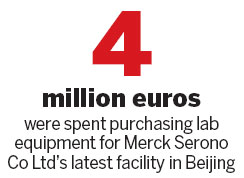China-Europe
Merck Serono sees growth in individualized R&D
Updated: 2011-09-01 07:52
By Liu Jie (China Daily)
BEIJING - Merck Serono Co Ltd, the biopharmaceutical division of Merck KGaA, will pursue stratified treatment research and development (R&D) in China, with the drug company's fourth R&D facility worldwide starting up in Beijing on Wednesday.
"We are really pioneers in the stratified therapy sector," said Stefan Oschmann, president of Merck Serono and a member of the executive board and general partner of Merck KGaA.
He added that the aim is to provide individualized treatment in line with patients' genetic and biologic profiles.
Beyond helping Merck Serono build on its advantages to expand its share in China's drug market, the world's second-largest by sales, the move will also help the company keep pace with China's healthcare reforms, analysts said.
The reforms are intended to provide access to medical care to the entire 1.3 billion population by cutting drug costs and expanding the medical infrastructure.
Stratified medicine, also known as the individualized therapy model, focuses on differences among patients. These differences matter in developing and prescribing drugs, making the entire process "safer, more effective and more affordable", Oschmann said.
 |
The Beijing laboratory of Merck Serono, with investment on equipment reaching 4 million euros ($5.78 million), is part of the Merck Serono China R&D hub. The company announced in 2009 that it would invest 150 million euros to establish an R&D hub in China between 2010 and 2013.
The Beijing lab will focus on developing treatments for cancer, neural degenerative disease and autoimmune and inflammatory disorders, all of which are aligned with Merck Serono's program for general stratified medicines. It is Merck Serono's fourth R&D hub in the world. The others are located in Germany, Switzerland and the United States.
The Beijing facility "is addressing specific scientific issues of Chinese people in the long term, it will develop for the world," Oschmann said.
Many global drug giants are stepping up R&D activity in China. According to the R&D-based Pharmaceutical Association Committee (RDPAC), a non-profit, non-governmental organization under the China Association of Enterprises, RDPAC's 37 member enterprises, all large R&D-based multinational companies, invested more than 20 billion yuan ($3.14 billion) in China during the 11th Five-Year Plan (2006-2010). One-third of the money went into R&D capacity.
US-based Pfizer Inc set up its second Chinese R&D center in Wuhan, Hubei province, last October, five years after establishing an R&D center in Shanghai. The company said it will increase the number of researchers at its R&D centers to 200 next year from more than 40 in 2010.
The Swiss drug maker Novartis AG announced at the end of 2009 that it would invest $1 billion over five years to build an R&D center in Shanghai,the largest of its kind in China.
Zhang Yanlin, a senior researcher of consultancy company China Investment Consulting, said that international drug makers are eyeing China's rich talent pool, huge patient base, relatively economic R&D costs and vast market.
The nation's pharmaceutical market has maintained annual growth of more than 20 percent for seven consecutive years.
According to the medical care research institute IMS Health, China's pharmaceutical market is predicted to expand another 25 percent to 27 percent to more than $50 billion in 2011.
China is among the top 10 for Merck Serono's global business and is expected to become the second-largest after the US within six years, according to Wayne Paterson, executive vice-president of Merck Serono Emerging Markets.
China Daily
E-paper

Pearl paradise
Dreams of a 'crazy' man turned out to be a real pearler for city
Literary beacon
Venice of china
Up to the mark
Specials

Power of profit
Western companies can learn from management practices of firms in emerging economies

Foreign-friendly skies
About a year ago, 48-year-old Roy Weinberg gave up his job with US Airways, moved to Shanghai and became a captain for China's Spring Airlines.

Plows, tough guys and real men
在这个时代,怎样才"够男人"? On the character "Man"
